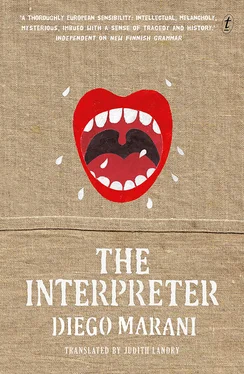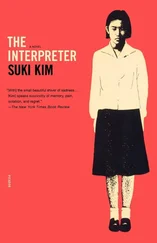‘Linguistic confusion, followed soon after by mental confusion. That is what awaits you if you take no action. You have come to me today with a wound too deep to heal by itself; if you ignore it, it will become infected and contaminate the healthy tissues too. Mental wounds do not produce blood or scabs or pus; the pain they cause is invisible and unbearable. Faced with such suffering, your brain will lock itself away in the only place of refuge left to it: in madness.’
Spoken at the fateful hour of sunset, those words frightened me but at the same time reassured me. I knew at last that I was indeed ill. In my heart I felt my resolve stiffening; I would follow the doctor’s advice to the letter. My cure would be a sort of purge: I would be cleansed of all the evil that had been building up within me and I would also be cured of the poisonous memory of Irene.
Dr Barnung was looking at me in silence; I could hardly make out his expression, the room had grown so dim.
‘I realise that you must find what I have told you deeply puzzling. I suggest that you take time to think things over, go home and let a few days pass. In the meantime, I’ll be happy to give you any clarifications you may feel you need. Don’t hesitate to phone me if you want to. It is vital that patients have complete faith in the therapy we offer them, and also that they do exactly what we tell them when they have agreed to go ahead. It is crucial that it should be you who makes the decision, that you do indeed truly want to be cured and that you are completely happy to have put yourself into our hands.’
The first thing that came into my mind, as I listened to him, was that the interpreter too must be suffering from my own disease. The idea that we unknowingly shared the same fate made me suddenly feel like a brother to him. I asked the doctor whether he had attended that very clinic.
‘I remember that patient — he suffered serious linguistic dissociation. Such pathologies are not uncommon among interpreters. Professional ethics prevent me from saying more, but your colleague refused to submit himself to my attentions, clinging to crack-brained theories which were simply further confirmation of his illness. I don’t know what happened to him in the end.’ There was a brief silence. An evening mist was gathering over the lawns outside the window. Dr Barnung was standing in front of me, thoughtfully rubbing his hands. I heard a brief rustling sound — the fabric of his stiff white coat — and the sound of rubber soles creaking over the parquet. Then the door opened suddenly, flooding the dim room with electric light from the waiting room.
Leaving Dr Barnung’s language clinic, I found myself obsessed by the thought of the interpreter. I became more or less convinced that the disease from which I was suffering was a form of infectious madness, an illness that was endemic among interpreters, a lethal strain which would reshape and transform itself like influenza among the Chinese. Lacking sufficient linguistic defences, suffering from poor German and protected only by my French, I must have caught it from that man who was himself infected by a verminous pullulation of foreign languages. Unprotected by the antibodies of a thousand other grammars, for me such a disease might have effects that would be devastating. I started picturing linguistic infections and epidemics; my mouth felt like a breeding ground for germs. I looked at the people in the airport waiting room who were speaking foreign languages as though they were so many spreaders of the plague. And now I understood how the interpreter must have suffered when he saw his life crumbling under the blows dealt him by that wily illness, which was destroying the most precious part of him, the well-honed instrument of his profession. He had tried to explain the phenomenon to himself as best he could, dreaming up far-fetched theories, seeking senseless explanations which had inevitably ended up disconcerting and infuriating his superiors. Loneliness and fear had done the rest. I began to feel a desire to track him down, to apologise to him and make up for the harm I had unintentionally caused him by offering my help. I had become like him: we were dogged by the same ill luck. But, by persuading him to put himself in Dr Barnung’s hands, I could still rescue him from the abyss of madness. In my dreams, as the cure progressed, I imagined a rare and open friendship growing up between us, nourished by gratitude, a lasting closeness which had no need of the complex underpinnings of love. My redeeming of that luckless man would be my own redemption. But perhaps, at the same time, I realised that, by now, his company alone could afford me some relief, that his was the only presence I could still bear to have beside me.
In the weeks that followed, I too was obliged to give up work. The personnel department sent me before a medical tribunal, which coldly noted my impairment and left me no alternative. My heart strangely light, I saw documents piling up on my desk containing the same time-worn phrases as those which Stauber had drawn up in connection with the interpreter, but this time no one objected to signing them. Within a few days I had received notification of my dismissal for health reasons; my colleagues shot me sombre glances in the corridors and my secretary would lower her voice on the phone when I went into the office. Suddenly I no longer had anything to do; the pages of my diary remained blank and I spent my days in a state of suspended animation. My superiors summoned me to hear a farewell speech and receive an award, but I neither answered their invitation nor attended the event. For once, Irene would have been proud of me. I received a letter from the administration requiring me to remove my personal effects from my desk and cupboard by five o’clock in the afternoon of Wednesday 23rd September at the latest, to return my identity badge to the Security Office and to take the parking permit off my windscreen. Felix Bellamy, grade one international functionary, destined for a brilliant career, had been wiped off the map.
Dr Barnung’s warning remained lodged in my mind, and I had now decided to put myself in his hands. I felt that the woes that had beset me were more important than my work and my career, that they spoke of a secret force which must be treated with the utmost respect and commitment. Before setting out for Munich, though, I was waiting for a sign, a time that seemed propitious: autumn, perhaps, season of mellow fruitfulness. I would lock myself up within the walls of Dr Barnung’s clinic as though in a monastery. Part of me sought such segregation, I was prepared to give myself wholeheartedly to the antiseptic practice of solitude. I told myself that I would be tempered by such spiritual gymnastics, it would make me stronger, better, more able to bear all that life still held in store for me. But, at the same time, I felt a growing desire to have news of the interpreter, to know what had become of him. From a more practical viewpoint, by now convinced that we had been struck down by the same malady, I hoped that by tracking him down I would gain a clearer idea of its course, alleviate its symptoms, perhaps even discover an antidote. Maybe he was already cured and could give me some advice; or maybe he had been entirely overwhelmed by it and was already imprisoned in a maze of incurable madness. Whatever his fate, it interested me.
With the help of a clerk who worked in the personnel department, I managed to get the interpreter’s last address. I knew the road in question; it was in a modern part of the city near the station, where the buildings were mostly furnished flats rented by businessmen and adulterous husbands. The window of the interpreter’s apartment looked out over a small square containing an unkempt garden, and it bore a notice with the words ‘To Rent’. Feigning an interest, I knocked at the door of the porter’s lodge to ask to visit it; puffing and panting, a woman took a set of keys off a hook and pointed to the lift.
Читать дальше












